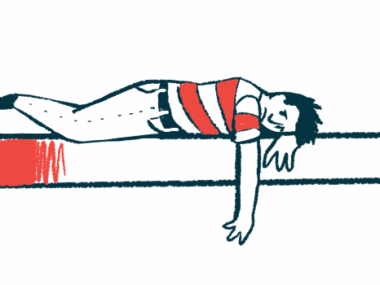How a ‘blackout’ is helping me cope with mental health challenges
A columnist struggles with the overwhelming impact of Cushing's disease
Written by |

I’ve spent the last hour staring at my computer. I need to write and get my work done, but my fingers don’t seem to want to move. Everything feels difficult this week. Showering, sleeping, and even just thinking feel like bricks being placed on my chest. I’m tired all day, but when it comes time to sleep, I can’t seem to close my eyes. I’m overwhelmed. I’m sad. And I have to take time to work through that.
My overall health has been overwhelming lately. Between annual MRIs (to see if I’m a good candidate for surgery to remove my pituitary tumor), inflammation in my body, and an inflamed nerve in my foot, I’m exhausted. And for some reason, the strategies that usually help me aren’t working. Even comedies and writing haven’t been able to distract me.
I’ve thus embraced what I call a “blackout.” I stopped answering messages. I’m listening to new music (shoutout to Sawyer Hill), and I’m watching shows I wouldn’t normally watch, such as “House” episodes that focus on Cushing’s disease. I need to break out of my habits and find new ways to get myself out of this funk.
Right now, isolation is helping me more than anything else. Each text, email, and Slack message feels immensely challenging. But TV on the couch with Popsicles? That’s doable.
Taking a step back
Cushing’s often takes a toll on my mental health. As I type this, I’m dizzy, sad, and agitated. Food makes me sick, and my body hurts. I’m frustrated. I tried leaving my apartment and spending time with people, but that just left me tired. I tried inviting people over, but I just felt out of it. Nothing seems to help me feel like myself again.
So I’m ignoring the world. I know, I know. It’s not the healthiest coping mechanism, but it’s the only thing keeping me sane right now. Sometimes I feel like I have to be everything to make up for being chronically ill. If I don’t constantly fight, push, and help, who am I?
I have to remind myself that I’m only human, and my body needs rest. Even if I’m not as productive for a few weeks, life will go on. I’ll be all right. I just need to listen to myself.
I’m always so focused on my physical health that my mental health tends to take a back seat. But right now I have to do whatever makes me feel OK — even if that means eating 13 Popsicles, taking a few days off work, and spending five hours in a bath. Mental health isn’t linear, and it doesn’t always make sense. What’s important is doing what works for me.
Of course, if this “blackout” becomes long term, I’ll seek assistance. But for now, I’m embracing the sad and trying my best. That’s all I can ask for.
You can also follow my journey on TikTok and YouTube.
Note: Cushing’s Disease News is strictly a news and information website about the disease. It does not provide medical advice, diagnosis, or treatment. This content is not intended to be a substitute for professional medical advice, diagnosis, or treatment. Always seek the advice of your physician or other qualified health provider with any questions you may have regarding a medical condition. Never disregard professional medical advice or delay in seeking it because of something you have read on this website. The opinions expressed in this column are not those of Cushing’s Disease News or its parent company, Bionews, and are intended to spark discussion about issues pertaining to Cushing’s.







Darren Waters
Thank you for writing your column it has been helping me understand the disease I've lost a lot of weight since the pituitary surgery but you have helped me to know that wanting to be alone and feeling tired all the time and somedays not being able to get out of bed and end up watching TV and playing games on my phone to distract me helps my mental health. I also have PTSD, fractured back and problems with my right leg leaving me in a wheelchair compounds my mental state but I'm still here and I'll fight everyday to keep going .
Again I thank you for your words of wisdom
Sincerely
Darren Waters